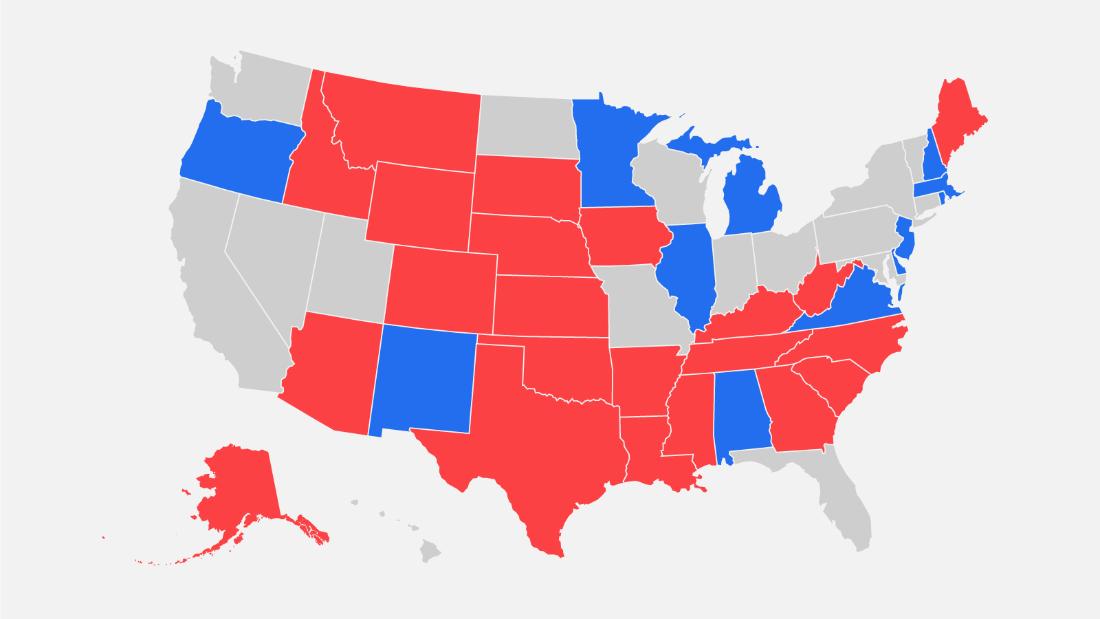Analysis: Biden said Sanders would cost Democrats the Senate. Is he right? - 4 minutes read
 "Well, you know, you know that -- with regard to Senator Sanders, the President wants very much to stick a label on every candidate," Biden said of how President Donald Trump would approach running against the Vermont senator. "We're going to not only have to win this time, we have to bring along the United States Senate. And Bernie's labeled himself, not me, a democratic socialist. I think that's the label that the President's going to lay on everyone running with Bernie, if he's a nominee."
"Well, you know, you know that -- with regard to Senator Sanders, the President wants very much to stick a label on every candidate," Biden said of how President Donald Trump would approach running against the Vermont senator. "We're going to not only have to win this time, we have to bring along the United States Senate. And Bernie's labeled himself, not me, a democratic socialist. I think that's the label that the President's going to lay on everyone running with Bernie, if he's a nominee."Later Biden hit that theme again in regard to federal judges:
"And that's why, as -- as you all look at it up here in New Hampshire and around the world -- excuse me, around the country -- you have to ask yourself, 'Who is most likely to help get a senator elected in North Carolina, Georgia? Who can win Florida, Pennsylvania, Minnesota? Who can do that?'"
And then again toward the end of the debate, Biden went back to this idea: "You've got to be able to not just win. You've got to bring along a United States Senate, or this becomes moot."
That argument is one that, in theory, Democratic base voters might respond to. After two Supreme Court Justices and nearly 200 total federal judgeships that have been approved under Trump with the aid of the Republican-led Senate, there's no doubt that Democratic base voters understand how important it is to not just win back the White House but also reclaim the Senate in 2020. But what about the argument itself? Is Biden right? Does Sanders cost Democrats any chance to win the Senate majority in November? Before we get to that, let's set the stage: There are 23 Republican seats up this fall as compared to 12 for Democrats. To win back the Senate majority, Democrats need to net three seats (if they win the White House) or four (if they don't). At the moment, the Cook Political Report, a non-partisan handicapping tipsheet, rates three GOP seats (Arizona, Colorado and Maine) as "toss-ups," while it sees the seat of Democratic Alabama Sen. Doug Jones seat leaning toward Republicans. Cook also has three GOP seats in the lean GOP category: The Kansas open seat being vacated by Sen. Pat Roberts as well as those of North Carolina Sen. Thom Tillis and appointed Georgia Sen. Kelly Loeffler. All of which means that Democrats need to win in states that Trump won in 2016 (and is likely to win again in 2020) if they want to win the Senate back. Because of the 23 seats Republicans are defending, just two -- Maine and Colorado -- were won by Hillary Clinton in 2016. Now, it's obviously difficult to gauge in February whether Sanders would jeopardize the ability of down-ballot candidates in, say, North Carolina or Georgia, or even Maine or Arizona, to win. The conventional wisdom is that Biden, who is running as a pragmatic centrist who can win back states like Michigan, Pennsylvania and Wisconsin that Trump won in 2016, is the safer bet for down-ballot Democrats. That Biden is safe. And that Sanders, who identifies as a democratic socialist and is proposing trillions more in federal spending on things like "Medicare for All" and the "Green New Deal," is, um not. The conventional wisdom also seems to be that Trump will label every Democrat on the ballot with Sanders as a socialist and they won't be able to fight back effectively because of Sanders' party affiliation and past statements on why he believes what he believes. There's relatively limited polling out there to compare Sanders at the top of the ticket to, say, Biden, so it's difficult to judge how much better or worse Sanders would perform at the top of the ticket in November. Or whether, even if he was solid at the top of the ticket, there would be down-ballot repercussions from either his party affiliation or hugely liberal policy positions. But as of today, what Biden appears to be basing his Sanders-will-cost-us-a-chance-at-the-Senate argument on is just the conventional wisdom that nominating a more overtly liberal candidate in more conservative-minded areas will hurt down-ballot Democrats. Again, maybe! But the numbers -- at least so far -- don't bear that out.
Source: CNN
Powered by NewsAPI.org